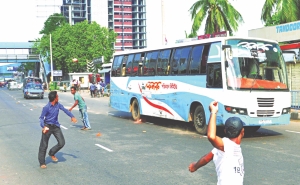| Home - Back Issues - The Team - Contact Us |
 |
| Volume 11 |Issue 18 | May 04, 2012 | |
|
|
Current Affairs Bracing for Trouble General strikes have come here to stay Shakhawat Liton
BNP Chairperson Khaleda Zia on April 24 had issued a four-day ultimatum to the government to find Ilias Ali and his driver, or else her party she said would go for tougher agitation. The government had failed to locate Ilias and his driver within the timeframe, and the main opposition BNP did not fail to keep its chief's promise. The deadline expired last Saturday and on the same day BNP's acting Secretary General Mirza Fakhrul Islam Alamgir announced back-to-back shutdowns for April 29 and April 30. BNP leader Ilias Ali, one of the organising secretaries of the party and former MP, and his driver went missing in the early hours of April 18. Everyone has condemned the heinous abduction of BNP leader Ilias Ali. Before Ilias, 22 people have so far disappeared this year under mysterious circumstances. Of them, no one was found, dead or alive. As many as 51 people went missing in 2011 while the number was 30 in 2010. Of them, 21 were found dead either by law enforcers or other people. In 2009, only two people went missing. In addition the extra-judicial killings by law enforcement agencies, forced disappearance is gradually appearing as an epidemic in the country. The people disappeared include activists or members of both the ruling and opposition parties as well as people with no political affiliation. Right bodies Odhikar and Ain O Salish Kendra in their reports have blamed the police, the Rapid Action Battalion (Rab) and the intelligence agencies for the disappearances. The main opposition parties did not enforce any hartal protesting the previous enforced disappearances. But it did not remain silent after Ilias Ali had gone missing. BNP chief Khaleda has already warned: “There is no scope to stop the movement. We have show great patience.” It is presumed that the BNP-led opposition parties will enforce more hartal and set up more agitation programmes in the days to come. Few incidents during the last two weeks' hartal have sent some unpleasant signals. Despite tight security, cocktails went off in and outside the Secretariat on Sunday, the country's administrative centre, much to the embarrassment of law enforcement agencies. A bus was torched in the evening near the Public Service Commission area, which is inside the cantonment. Both incidents have given the message that the perpetrators are gathering more strength to do something even more serious to demonstrate their prowess in the coming days. The ruling party, as the previous records show, might make some blunders which will add further fuel to the opposition movement. On the directives of the government high ups, the police have filed cases against some senior BNP leaders in connection of violence occurred during the hartal. All the prevailing signs indicate that the BNP-led opposition parties will make efforts to gear up their ongoing agitation this May before their deadline for restoration of the caretaker government system expires on June 10.
It is almost certain that the ruling AL will not accept the opposition's demand and will not make any announcement to restore the caretaker government system. People will have to face the consequences of the government's failure to meet the opposition's June 10 deadline. They will have to suffer much due to political violence in the coming days. Like they have done in the past, after enforcing every hartal, the opposition political parties will come up with the very familiar claim that the people have spontaneously made the hartal successful and are not with the autocratic government. The ruling party leaders, on the other hand, will be claiming that people have rejected the hartals. Both the camps pass the responsibilities of fighting conspiracy and autocracy onto the people. Their statements prove that people are all powerful. In fact, Bangladesh's Constitution in article 7 (1) declares that all powers in the Republic belong to the people, and their exercise on behalf of the people shall be affected only under, and by the authority of, this Constitution. The truth and reality are very unpleasant and shocking– the majority of the people do not know much of the Constitution that makes them the owner of the Republic. National Human Rights Commission (NHRC), in a baseline survey on human rights in Bangladesh styled "Perceptions, Attitudes and Understanding", revealed that 58.4 percent surveyed people had not heard of the Constitution. The survey report published in 2011also said that only 6.1 percent of the surveyed people knew they are protected by the Constitution. The bleak situation however appears as a blessing for the country's politicians, who are supposed to serve the people and exercise the power on people's behalf. But in reality they are doing just the opposite.
The writer is Senior Reporter, The Daily Star.
|
||||||||
Copyright
(R) thedailystar.net 2012 |


